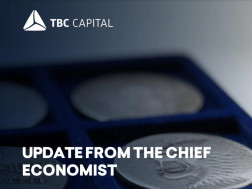TBC Capital a report on Monthly Macro Update. As of the report, recent data release clearly points to another year of strong growth in Georgia. Last time TBC Capital said it would be above 6%, which now looks to stand at 6.4%.
According to the report, the investment bank notes that 2024 exports and remittances YoY dynamics look to stand somewhat below trend largely driven by the one-offs. With this, the migration impact, earlier expected to contribute negatively, now should have a minor but still positive effect, alongside a somewhat similar impact arising from the fiscal stimulus. At the same time, the continuous strong momentum is the largest industry in Georgia – conventional tourism, without migration impact, has still a boosting contribution.
"And what about inflation? Among the many inputs we use, here to highlight only a few: first, stronger growth means higher inflation, and, in case of Georgia, that relates to the underlying one – service inflation historically having the highest correlation with GDP and with also elevated unit labor costs. Yet, in Georgia, services have only around a 25% share in the CPI basket. And for the main part, what often works best is the GEL PPI-based REER without inflation in Georgia. Even under a somewhat GEL weakening scenario, that relationship still suggests headline inflation to stay slightly below the target, assuming the sharp jump in oil and other commodity prices is not yet a baseline. Though, from the upside risks, we also note the recently elevated PPI in Georgia, which is often seen as a leading indicator for consumer prices.
As below the target inflation is the baseline, this may imply further easing, but even before the recent developments that was not our bet, which implied 8% or only slightly lower policy rate by the end of the year. What has changed? As outlined earlier, a tight Fed stance was a major reason for a postponed easing in Georgia towards a neutral rate of probably 7%. Stronger than expected March inflation print in the US makes this driver even more relevant, in spite of the ECB likely moving ahead. Furthermore, elevated geopolitical risks are for sure cut-negative in Georgia, as well as strong growth, despite the fact that we still say slightly below the target inflation, however, with underlying measures such as service one remaining somewhat elevated. Therefore, assuming net inflows are strong, and we do not see material GEL weakening pressures, betting at 8% by the end of 2024 looks reasonable.
On the GEL side, when looking at the 3 pillars, we say inflows GEL-supportive or at least neutral, again inflation likely neutral and the GEL REER being slightly, but still above trend – the GEL-negative. Similarly to inflation, here also to try to be selective, recently stronger USD and weaker EUR is GEL-negative. Therefore, unless the USD weakens internationally – which looks unlikely in the near term, we will likely see strong net inflows fueling the NBG reserves, rather than higher GEL/USD. At the same time, as always, for many reasons, including seasonality, elections etc., the shifts in sentiments matter, though having a rather short-term impact on the GEL.
Summing up, our updated 2024 baseline growth is strong, but what about the risks, now also to mention the recent another unfortunate escalation in the Middle East? While not arguing that the Georgian economy is entirely delta neutral, there are important spillovers to keep in mind. In particular, for sure stronger USD as a safe haven is a risk, although unlike a decade ago, it is already quite strong, implying at least some limitations to further appreciation. In addition, there could be an argument that the escalation may be a trigger for the hard rather than soft landing in the US. Furthermore, certainly Georgia is a net commodity importer, but the country gets even more inflows from commodity exporters, leading to a broadly balanced or maybe even somewhat positive net exposure to oil and, in general, commodity prices. At the same time, the risk aversion and possibly lower tourism inflows are definitely a source of shock, but what about the migration impact? In this regard, we note that last year, we saw lower tourism expenditures as such from Israel, but higher consumer spending by Israeli non-residents, likely related to the positive migration spillover", - the report reads.























